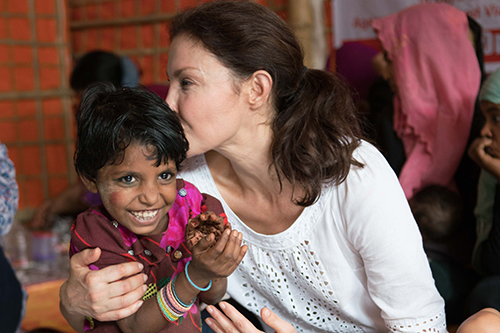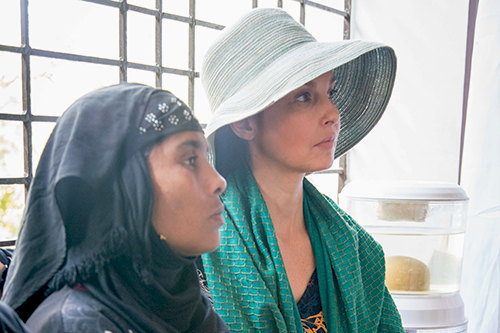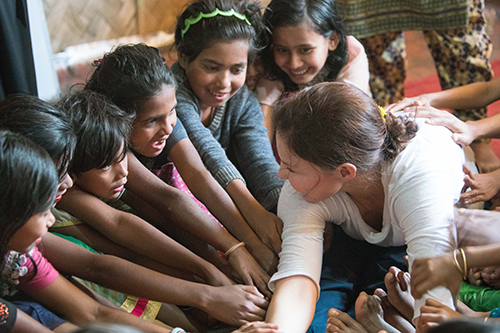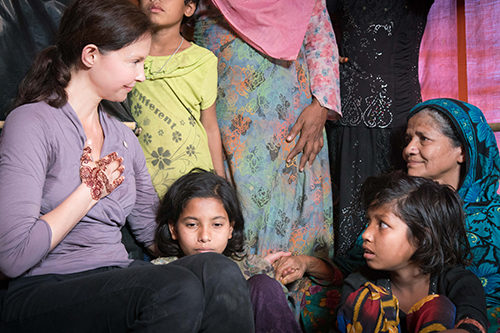Noticias
Dispatches from the road: UNFPA Goodwill Ambassador Ashley Judd on the horrors facing Rohingya refugees
- 26 Febrero 2018
Noticias
In mid-February, humanitarian advocate, writer and actor Ashley Judd travelled to Cox’s Bazar in Bangladesh to meet Rohingya refugees who have escaped violence in Myanmar’s Rakhine State. There, she visited UNFPA-supported clinics and women-friendly spaces. Below are excerpts from diaries of her trip, edited for length and clarity.
COX’S BAZAR, Bangladesh – The walk from Myanmar has taken the refugees I meet five days, nine days, some of them, 15 days. Their burnt villages pushed them into motion. Some 688,000 distraught and traumatized Rohingya have arrived in Bangladesh in the last six months, and they are now spread over 26 camps, as well as settlements and host communities.
Overcrowding is a grave problem, as is the hilly, steep, loose terrain. Monsoon seasons starts in June, a natural disaster coming to complicate an already complex humanitarian crisis.
Within the camps, there is a shortage of everything that matters: shelter, food, safe drinking water, sanitation, health care, peace of mind, knowledge of where one’s loved ones are, or escape from the knowledge that one has left babies, children and elderly behind in Myanmar.

There are 19 UNFPA women-friendly spaces in Cox’s Bazar. These spaces, or shanti khana (“peace houses”), as the Rohingya call them, are safe places where women can relax, build peer networks, receive psychosocial support, and hear about the services that are available across the camp. There are case workers and case managers.
We visit the Lambasia women-friendly space. There is a one-on-one counselling room, with pillows in case it’s easier for a woman to lie down as she shares the horrors of what happened to her. The only other room is for the midwife; it has a table for examinations and a poster on the wall.
The space doesn’t have to be much to be everything to the Rohingya who come here.
Over 40 women have come today. Listening takes over. Stories pour forth.
The woman speaking, she lost her father and her son in a slaughter. The woman speaking, she lost her husband and had a newborn. She used clothes to wrap her freshly post-natal belly, and carried her newborn. She paid someone to carry her 1-year-old and her 3-year-old.
They are also here to learn.
There are information sessions, which teach so much. The women scoot forward to learn that men may seek to take a child in marriage, but girls’ bodies aren’t ready for sex, pregnancy and childbirth. And people who sidle up to a family with rations, with slick talk, may only want to take girls to a local hotel to rape them, as has happened with people they know. Voluntary family planning methods are available to help women prevent having another baby right now in the camps and settlements. Some 170,000 of the newly arrived women and girls are of reproductive age.
And here there are also reunions.
Women and children find each other after being separated by the mayhem of murder and pain. Mothers, sisters, mothers-in-law, sisters-in-law, they leap at each other and weep with relief of reunion, weep with the painful revelations of who has been lost, back in the village, on the way. They listen with empathy to stories of the journey, of giving birth en route, of leaving loved ones behind.

We so often don’t think of pregnant women in crises. We somehow think life freezes. But women were pregnant before they fled Myanmar, women get pregnant by their husbands and by men who rape them. Childbirth stops for nothing. At this moment, 34,000 of the newly arrived refugees are pregnant.
We visit Camp D5 to visit midwives, who have been frantic since the Rohingya crisis began. Since August, they have screened more than 170,000 women – both refugees and women from the host communities – for pregnancy and medical needs.
Among the total affected population, some 40,000 women have received antenatal care. More than 1,500 babies have been born at UNFPA-supported facilities.
But 78 per cent of refugee births take place outside any health facility. UNFPA has distributed over 5,000 clean delivery kits (containing a sanitary mat for child birth, gloves, a bar of soap, a razor, a clamp for the umbilical cord and a suction bulb to clear the newborn’s airway), encouraging mothers to take them to any health facility when labour begins.
At the Balukhali health centre, the queue for the maternal care is stultifying. It splits in three directions. And there are dozens more women waiting to join the infernal queue.
Then I meet Ajida.
We are at the front of the line for maternity service, but Ajida skips her turn, preferring to sit with me.
She tells me her story. After the slaughtering, she and her family – including eight children – fled. In a boat, they were pursued. The boat capsized. Her 10-year-old, her 7-year-old twins and her 3-year-old died. She misses her family.
She is in her ninth pregnancy – but she tells me the baby hasn’t moved in a month. I want to pretend she did not say this, because this news is so bad it can’t be true on top of four already dead children.

We visit another women-friendly space, where women are safe to do what women do, grouped among equals.
Here, they tell me: “It is so hot indoors. It is unbearable. Can you arrange for us to have a fan? My daughter could sew and earn a little money if we had a sewing machine. My 12-year-old son was hit in the head with a bullet and I left him for dead, but when I got here other people told me he had survived, and he is here now. I saw the village burn, then I ran. So many women were being raped. We don’t have the money or the veil to go outside. My husband says I am supposed to be covered. Freedom is nowhere.”
Despite their suffering and deprivation, they are generous, giving.
One massages me like I have rarely been massaged before, with devotion. She peppers me with kisses, all over my face.
And another: She cradles me in her lap and strokes my hair.
And another: She presses her palms all over my head, gently rocking both of us, as we watch a drama about the perils of child marriage.
It seems the human spirit, in order to survive, needs to be able to give, even in the most oppressive circumstances.
What other explanation is there for my walking into this space and being the one to whom so very much is given? It is part and parcel of human dignity, to be able to give.

On the last day, I return to the Lambasia women-friendly space.
Every now and then, it washes over me that every single person in the room walked here. Yesterday, I needed to do this reality check out loud: “You really walked here. Everyone one of you.” Every one of them nodded. Yes. I walked here.
I think about that. The children with whom I am snuggling and cuddling walked here from Myanmar.
It’s not right. Children aren’t supposed to be on a forced migration. They are supposed to be in school, or being bathed by attentive caregivers, or daydreaming about playdates.
More than 40 children and I sit in a tightly huddled circle. They want to engage, to be connected, and it seems anything is fun for them, anything is play.
I stretch my legs out in front of me. They do the same, all our feet pointing like a compass to some lovely centre of sameness, of belonging.
Finally, it is the end of the day. My time in the camp has concluded.
Yet it feels like not enough. It could never be enough – not when marrying a girl to an adult man is seen as the only “hope” for her future; not when a woman attempting to bathe is assaulted merely for being as God made her. When there isn’t enough shelter, food, water, security, dignity, and there is no end in sight, how can listening and witnessing ever be enough?
While it isn’t enough, it has to be, or I would lose my mind with sweeping, grim, interminable reality of their plight, and the too much, and not enough, of their lives.